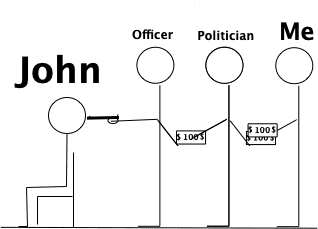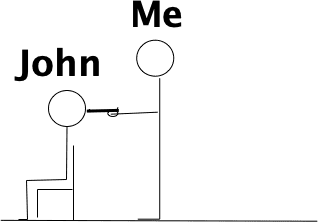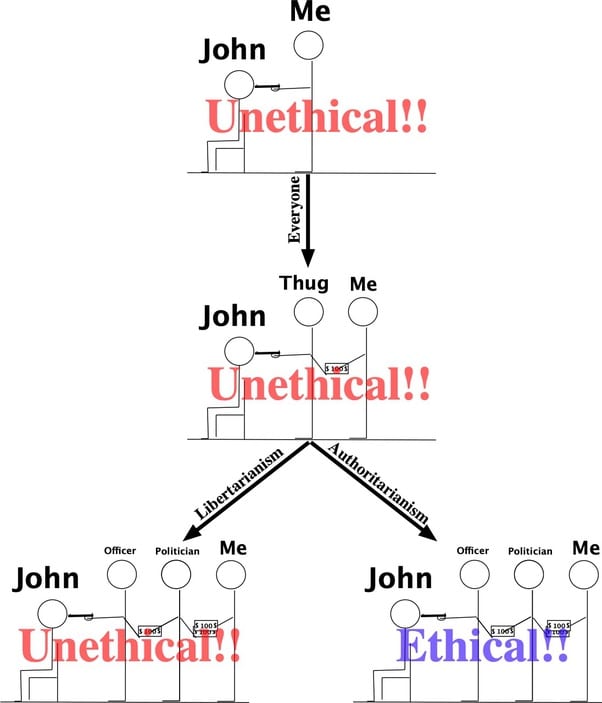Here is how I illustrated a definition of libertarianism to a group of non-libertarians in Massachusetts. I had already signed my Statement of Intent to move to the ‘Live Free or Die’ state of New Hampshire, and so, when an advanced personal growth seminar gave me the assignment to “Illustrate a strongly held belief”; the philosophy of liberty was on my mind.
An Illustration of Libertarianism
I sat John down in a chair on the stage, and turned to explain to the 35 attendees:
“Let’s say that John was peacefully minding his own business
but I wanted something that John had,
or I wanted John to do something that he didn’t want to do.”
I held my index and thumb like a gun and pointed it to John’s head.
“Almost everyone agrees that
if I threaten violence against an otherwise peaceful John
… to give me something that is justly his
…… or to do something for me that he does not want to do,
that I am doing something evil and wicked.”
Everyone was smiling and nodding.
(In Massachusetts, “We don’t like guns”);
Everyone knew where this was going!)
I pulled up burly Andrew, had him point his “gun” at John’s head, and took out a $100 bill.
“And almost everyone also agrees that
if I hire a thug like Andrew
… to threaten violence against an otherwise peaceful John
that I am still doing something evil and wicked.”
Most of the audience was still nodding, but a few, more politically astute, were showing worried signs of caution.
I brought Steve onto the stage, placed him behind Andrew.
I gave Steve $200 and had him hand one of the $100 bills to Andrew who was still holding the gun to John’s head.
“But most people think that,
if I vote to hire a politician like Steve,
… who hires an “officer” like Andrew,
…… to threaten violence against an otherwise peaceful John
……… to take that which is John’s and give it to me,
then what was evil before is evil no more
… but has been magically transformed into Good.
And I drove home our libertarian point about the universality of human ethics:
“A libertarian is someone who does not believe
that human ethics change
based on the number of intermediaries,
… how I choose them,
…… or what I call them.
The Definition of Libertarianism
While this libertarianism definition distinguishes libertarianism from authoritarianism succinctly, most people have been indoctrinated into believing that political authority provides an exception to the universal human ethics that we all try to live daily. The subjugated have been taught that they may ethically hire rulers to do that which they know they may not ethically do themselves.
Thus, a definition of libertarianism is that:
The same act that is unethical for any of us does not magically become ethical for a politician.
The Group Compared to Free Staters
The group politely clapped, but several were visibly angry. One woman fumed at me for the rest of the day. As we were going home late that night, she came up to me, “Don’t ever do that, again!”, and walked off without another word, satisfied that her warning about my libertarian definition had been delivered and would be heeded.
But now that I have moved to New Hampshire, I’m happy to report that I do “that” all the time: I talk and write about the ethical definition of libertarianism every day.
I have a solid group of liberty friends around me, all of whom are trying, with me, to create one place on earth where human relationships will be peaceful, consensual, and voluntary. None of us would ever consider the authoritarian approach to human relationships. We are dedicated to not threatening violence against peaceful, innocent people; we won’t threaten it ourselves, and we won’t vote for proxies to threaten it. Not even if it would profit us. Not even if we could conform others to our preferences for how to live. And we certainly haven’t fooled ourselves that there is some ethical exception for politicians or government bureaucrats so that they can do evil for us.
Those of us who have moved here to create a free state know that hiring someone to do an evil act can never make evil Good. Evil remains evil, no matter how many people voted for it, and no matter how many people we might insert between ourselves and the evil act.
And a Free State, for me, is about finding ways to eliminate (legitimized) evil from our small subsociety.
Here is how I illustrated a definition of libertarianism to a group of non-libertarians in Massachusetts. I had already signed my Statement of Intent to move to the ‘Live Free or Die’ state of New Hampshire, and so, when an advanced personal growth seminar gave me the assignment to “Illustrate a strongly held belief”; the philosophy of liberty was on my mind.
An Illustration of Libertarianism
I sat John down in a chair on the stage, and turned to explain to the 35 attendees:
“Let’s say that John was peacefully minding his own business
but I wanted something that John had,
or I wanted John to do something that he didn’t want to do.”
I held my index and thumb like a gun and pointed it to John’s head.
“Almost everyone agrees that
if I threaten violence against an otherwise peaceful John
… to give me something that is justly his
…… or to do something for me that he does not want to do,
that I am doing something evil and wicked.”
Everyone was smiling and nodding.
(In Massachusetts, “We don’t like guns”);
Everyone knew where this was going!)
I pulled up burly Andrew, had him point his “gun” at John’s head, and took out a $100 bill.
“And almost everyone also agrees that
if I hire a thug like Andrew
… to threaten violence against an otherwise peaceful John
that I am still doing something evil and wicked.”
Most of the audience was still nodding, but a few, more politically astute, were showing worried signs of caution.
I brought Steve onto the stage, placed him behind Andrew.
I gave Steve $200 and had him hand one of the $100 bills to Andrew who was still holding the gun to John’s head.
“But most people think that,
if I vote to hire a politician like Steve,
… who hires an “officer” like Andrew,
…… to threaten violence against an otherwise peaceful John
……… to take that which is John’s and give it to me,
then what was evil before is evil no more
… but has been magically transformed into Good.
And I drove home our libertarian point about the universality of human ethics:
“A libertarian is someone who does not believe
that human ethics change
based on the number of intermediaries,
… how I choose them,
…… or what I call them.
The Definition of Libertarianism
While this libertarianism definition distinguishes libertarianism from authoritarianism succinctly, most people have been indoctrinated into believing that political authority provides an exception to the universal human ethics that we all try to live daily. The subjugated have been taught that they may ethically hire rulers to do that which they know they may not ethically do themselves.
Thus, a definition of libertarianism is that:
The same act that is unethical for any of us does not magically become ethical for a politician.
The Group Compared to Free Staters
The group politely clapped, but several were visibly angry. One woman fumed at me for the rest of the day. As we were going home late that night, she came up to me, “Don’t ever do that, again!”, and walked off without another word, satisfied that her warning about my libertarian definition had been delivered and would be heeded.
But now that I have moved to New Hampshire, I’m happy to report that I do “that” all the time: I talk and write about the ethical definition of libertarianism every day.
I have a solid group of liberty friends around me, all of whom are trying, with me, to create one place on earth where human relationships will be peaceful, consensual, and voluntary. None of us would ever consider the authoritarian approach to human relationships. We are dedicated to not threatening violence against peaceful, innocent people; we won’t threaten it ourselves, and we won’t vote for proxies to threaten it. Not even if it would profit us. Not even if we could conform others to our preferences for how to live. And we certainly haven’t fooled ourselves that there is some ethical exception for politicians or government bureaucrats so that they can do evil for us.
Those of us who have moved here to create a free state know that hiring someone to do an evil act can never make evil Good. Evil remains evil, no matter how many people voted for it, and no matter how many people we might insert between ourselves and the evil act.
And a Free State, for me, is about finding ways to eliminate (legitimized) evil from our small subsociety.






Hey! That’s a nice explanation 🙂
You left out an important reality. The guy paying the politicians has more money than you, so who do you think owns the politicians.
Hi Dennis, great post. In a libertarian society do you think that it is ok to use violence to enforce a contract? For example, if you contracted to hire someone to build you a house, and they pocketed the money, could you have a clause in the contract that specifies that violence could be used to reclaim the money?
Good Morning. I am intrigued, but a bit perplexed at the same time. The above diagram begins with John, who had done nothing wrong, being forcibly robbed/detained against his will. The general consensus, among the majority of the population, regardless of political preference, is that this is wrong. Then the scenario above ultimately changes, and the assailant becomes an officer being paid to hold an innocent man against his will. This, in the majority of cases, is not the way things go. Officers only draw their weapon if the victim, John, or their own life is in imminent danger, they do not stop random, innocent, people on the street and forcibly detain them in some politically shameful ploy, as the final diagram implies. It seems that the final diagram/statement would conclude that we should have no system of policing?
People are generally good, however, there are those who are not. What is your solution, or plan of action, for those who are not? What is your suggested response/solution for the first diagram, when someone does point a gun to your head to steel, rape, or murder? Should there be no recourse, no punishment, no accountability for those actions? If there are no police, who decides what is just, and who makes sure that resolution is carried out?
I live in a state where politicians line their pockets at the expense of the taxpayers, has one of the highest gang/homeless/and illegal immigrant populations nationwide, cannot seem to balance a budget to save their lives, grossly restricts gun owners rights, fosters the “free money” welfare system in such a way as to encourage unemployment, forcefully requires teachers to pass students that should fail, puts our schools and educators last, makes it nearly impossible for small business owners to succeed, one of the most liberal (free to be me as long as your views are the same as mine and you’re NOT white heterosexual) states, highest insurance rates (all types), highest fuel costs, highest utility costs, all of which creates a ridiculously high cost of living, high crime rate, drug abuse, highest lawsuits, criminals rights prevail over victims rights, and notably unfriendly, place to live. In essence, my point, living in one of the most “liberal” states in the Union has proven, to me, that Liberal does not equal Liberty.
What would an “ethical” solution, to the scenario above, look like from a Libertarian stand point? Please do not misunderstand, I love the premise of the goal your group of liberty friends seek to achieve, and by no means am I trying to be argumentative, that would be a great place to live and work. However, the original scenario was an assailant threatening violence against a peaceful, innocent person. You shifted the scenario to show an example of a corrupt government, but did not provide a model to show what an uncorrupt/libertarian solution to the scenario of an innocent man being wronged would look like. That is the diagram our country desperately needs.
I look forward to hearing from you soon.
Brilliant
Going with DK’s train of thought on this.
Hi, DK! 🙂 You ask important questions, but they fall well outside the scope I had time in this one article.
—–
> “the original scenario was an assailant threatening violence against a peaceful, innocent person. You shifted the scenario to show an example of a corrupt government.”
Ah, no. The (third) picture is simply a government official. Not corrupt, but doing what his function is. The innocent by-sitter is still innocent. But now he is being extorted (for say, taxes, debt, licensing fees, to purchase “services”).
You probably are confused because you don’t recognize “the violence of the state” in its laws — that every law must have behind it the threat of deadly violence ultimately for noncompliance with the demands of your rulers. Sure, they may start out with a letter and a fine, etc., but if you do not comply, ultimately, there will be a man with gun pointed to your head — and for no ethical crime — simply for not complying with some ruler preference or for not paying him for some ,monopoly, imposed “service” that you did not order.
While not part of this essay, I do write a lot about the hidden initiation of violence of the state that law must always imply. It is why men die for selling “Loosie” cigarettes. But that description is outside the scope of this article. This article presumes that you understand that a law has behind it deadly violence.
You can see that argument, however, in,
0781: Which political policies undermine peaceful disagreement in society?
https://www.quora.com/Which-political-policies-undermine-peaceful-disagreement-in-society/answer/Dennis-Pratt-3
0698: How is taxation slavery?
https://www.quora.com/Do-Libertarians-believe-that-taxation-is-theft-or-taxation-is-slavery/answer/Dennis-Pratt-3
1550: What most troubles a libertarian about how the government uses its monopoly on violence?
https://www.quora.com/What-most-troubles-you-as-a-libertarian-about-the-way-the-government-uses-its-monopoly-on-violence/answer/Dennis-Pratt-3
——-
> “but did not provide a model to show what an uncorrupt/libertarian solution to the scenario of an innocent man being wronged would look like”
Again, you are right. I do not here cover how a freed people might defend themselves from either a common thug, or an official thug. I write about such in many of my other articles, but that was not the purpose, or within the scope, of this piece to write about effective protection against crime absent a ruler who must always first initiates threats of violence on you.
You can look, at perhaps:
1485: Would ostracized criminals in a libertarian/ancap society die of starvation?
https://www.quora.com/Would-criminals-in-a-libertarian-ancap-society-die-of-starvation-due-to-being-rejected-food-everywhere/answer/Dennis-Pratt-3
0738: In a libertarian society, who protects private property?
https://www.quora.com/Who-protects-private-property-under-an-ideal-libertarian-system/answer/Dennis-Pratt-3
0663: How could a libertarian society handle psychopaths?
https://www.quora.com/What-is-the-libertarian-way-of-dealing-with-psychopaths-given-that-fewer-people-would-go-to-jail/answer/Dennis-Pratt-3
1635: What is the libertarian view on the police?
https://www.quora.com/What-is-the-libertarian-view-on-the-police/answer/Dennis-Pratt-3
1200: Could private police protect people in an anarcho-capitalist society?
https://www.quora.com/Cant-private-police-protect-capitalist-in-an-anarcho-capitalist-society/answer/Dennis-Pratt-3
1199: What happens in a libertarian society if somebody does initiate aggression?
https://www.quora.com/What-happens-in-a-libertarian-society-if-somebody-does-initiate-aggression/answer/Dennis-Pratt-3
Hi, Joan, I answered DK’s (and your answer). I am hoping that you can see it… 🙂
Can you tell me how this theory applies to social determinants of health? Could you use the Flint water situation to discuss how a libertarian would view this situation? Thank you.
Hi, Katherine. I write such answers on Quora. But they take a while. It’s about a four hour job for any answer, and lately I’ve been working on building a liberty club house here in the Free State, so I have not been writing as much. I say this only as an excuse not to try to be required to write an answer here in the comments section that would be persuasive.
You can see my other answers having to do with health and libertarianism here:
https://www.quora.com/q/libertarianmusings/Healthcare
Perhaps one of those would help in your specific concern.
As to Flint, the government’s mismanagement of water, their denial, the lack of competition, etc. would not be what a freed society would have. Such behavior would have bankrupted any private company behaving so nefariously way before the crisis was fully realized, and enabled alternatives and competitors to come in.
Libertarians are often asked to solve problems that were caused in the first place by government. My solution is to stop government from causing those problems in the first place by removing the violence of the state to allow greater resilience (e.g., competitors and alternatives) and greater accountability (e.g., bankruptcy, lost market share, lost jobs) for such gross errors.
Perhaps I will someday write about Flint. It’s an amazing illustration of how government violence not only fails, but prevents new solutions. 🙂 I am though an ethicist, and thus I would not favor government violence as a solution even if it wasn’t the cause of the problem; I would support freed people finding a variety of solutions and allowing the best solutions to bubble bottom up.
I am intrigued enough to add this question to my some day maybe list. Unfortunately, that list now numbers over 2000 unanswered questions (I’ve only answered 1800 questions so far), so it make take longer than my lifetime to reach. But you might want to look at the other libertarians answers to your question:
https://www.quora.com/What-do-libertarians-think-about-the-Flint-MI-water-crisis?q=flint%20water%20libertarian
Thank you for inquiry. 🙂
When you said “But now that I have moved to New Hampshire, I’m happy to report that I do “that” all the time” I laughed 🤣
To me, libertarianism in its purest form is a bit of a stereotype, perhaps because all of the most prominent libertarians I know are very good at pointing out what they oppose but not as good at acknowledging what rules they would support. That’s easy when government overreach is so entrenched in our daily lives as is championing liberty. However, most of us do believe that some rules are necessary even in a free society and while I often argue that even in a society that is based on the protection of individual rights, there must be some sort of authority to intervene when individual rights are violated or we’re basically living in the wild west of old.
Keeping in mind, I don’t fancy myself a libertarian because I have not found one who seems to support any rules at all. I consider myself a classical liberal and libertarian-leaning independent. I do not champion the “taxation is theft meme,” although I firmly recognize that taxation in its current form is the mandatory forfeiture of private property and I do not support that. I recognize that the private sector alone is not ideally suited to solve all problems.
I have also unfortunately found that too many espousing libertarian views don’t really believe in doing the voluntary good that is necessary for mankind’s benevolent coexistence and really only want to be left alone, so the support the ideology most likely to make that happen.
So with the understanding that there is a wide divergence of opinion, the question for me remains, what sort of limited government can libertarians support?
Hi, Craig, The FSP is really designed for libertarians – for people who already believe that they fully and exclusively own their own bodies – and no master, however selected by others, has a superior claim to their body. The questions you are asking are reasonable, but well ou side the scope of the Free State, nor do they have a simple answer quickly offered in a reply to a comment. It took me almost a year of intense investigation to shed my indoctrination into the state, and I have been on a 40 year learning journey since (including one four year stint where I wrote almost 2,000 essays in questions like yours).
For those of you who believe that coerced-under-penalty-of-death slavery-to-rulers is the ONLY way that society can ever be structured, think of the Free State Project as a proof-of-concept, to demonstrate one day a functioning VOLUNTARY society, in which consent is required for all human interactions and the initiation of violence is the one thing specifically prohibited.
If you are more than idly curious, I invite you to come and visit us. I am often found in our liberty clubhouse, The SHELL, and would be glad to go over the ethics of self-ownership as well as possible solutions to “But who will pick the cotton” concerns when the indoctrinated are faced with abolition of slavery-to-rulers.
Do let me leave you with a quick glimpse, should you not be interested in enough to visit us. 🙂
> “good at pointing out what they oppose but not as good at acknowledging what rules they would support”
Yes. Good pick-up, Craig. Libertarianism does NOT tell you how to live your life. It tells you only the minimum that you owe everyone else — and that is respect for their self-ownership – you will not enslave them for your projects, preferences, nor profits, nor will they enslave you.
(I explain this a bit here:https://www.quora.com/Do-libertarians-believe-in-the-Golden-Rule/answer/Dennis-Pratt-3)
Once this foundational respect of one another is established in a libertarian society, a plethora of VOLUNTARY societies can arise side-by-side – some with MANY rules strictly followed, and others with far fewer, and looser, rules. Some may prohibit even meat, while others could countenance heroin. Libertarianism as such is silent on which society you may voluntarily create or join, as long as you respect each others’ self-ownership. In this way, it’s like the separation of state and religion – you may pick your religion, but you may not hang your neighbor for not picking your religion – except with libertarianism you pick your “state”.
The voluntary aspect is that someone else’s society cannot be forced on you, you must consent to whichever you join, and you may remove your consent, leaving that society in tact with life, limb, and property.
Now, I know we were raised to believe that one, and only one, society is possible, and our purpose is to fight tooth and nail with one another to force the other into our preferred society. Libertarians believe that’s just silly apology for a psychopathic ruling class to control us all. Relax that assumption, and much of our bitterness disappears. In the Free State, for example, we have communities that are quite different in culture, with their rules, and not welcoming necessarily those who do not follow their rules. But it’s all voluntary.
Some of this is a bit of a leap for someone who still believes the only way to organize ourselves is involuntarily, under a solitary ruling elite who dictate to us what we may do with our bodies, our associations, our labors, and our properties, and that our only role therein is to choice which pretend-choice will be our masters of the next few years and hope our masters will chose our preferences. But here’s a bit of a glimpse: https://www.quora.com/What-would-your-ideal-government-do/answer/Dennis-Pratt-3
Obvious problems occur on enforcing contracts and rules across properties, but these are readily taken care of by competing agencies designed for that purpose.
If you’re really curious, why not pick up “Machinery of Freedom” by David Friedman (son of Milton)? I’m primarily focused on ethics – we must live consensually respecting one another’s self-ownership, because to not do so is treating the other as one’s slave – committing evil against our fellow man. David has no such concern, but is more focused on “better functioning” society, that is, ‘Consequentialism”. He’ll go over many of the “solutions” for who will pick the cotton when our masters’ whips are retired. I? I’m primarily concerned with retiring the whips, and let us figure out the rest w/o masters.